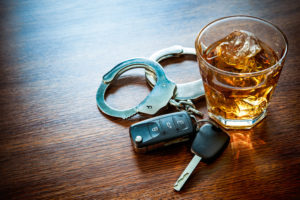
Alcohol functions by slowing down the body, including slowing down the function of the brain, how the brain thinks, and how the body reacts. As a person drinks, alcohol is absorbed into the body and into the blood, increasing blood alcohol concentration or BAC. BAC is measured by the weight of the alcohol in a certain volume of blood. As BAC increases, the negative effects of the blood in slowing down the body and reaction times also increases. As previously discussed on the Edward M. Janzekovich law blog, the legal limit in New Jersey and across the country for BAC is .08 grams of alcohol per deciliter (g/dL) of blood or .08%.
However, .08% is not a magic number that marks the border between intoxication and sobriety. It is just an arbitrary number set by legislators. What this means is that a person can appear drunk before he or she has a BAC of .08%. In fact, for this very reason, the legal BAC used to be higher at .10%., and it was recently reduced to .05% in Utah. Other states, such as California, are also considering reducing the legal limit. On the other hand, many people appear perfectly fine with a BAC over .08% and you cannot tell that they would be legally drunk.
What this means is that every person is different, and alcohol will affect every person differently. A recent report by the United States Department of Transportation’s National Highway Traffic Safety Administration (NHTSA) attempts to discuss and define how people will act depending on their current BAC. However, these descriptions are just based on averages. Again, a person may act more or less intoxicated than described in the report.
The Effects of Blood Alcohol Concentration
Although every person is different, all people can be affected by alcohol in sufficient quantities – and the higher the amount of alcohol in the blood, the more noticeable the effects.
| BAC | Typical Effects | Predictable Effects on Driving |
| .02 | Some loss of judgment; relaxation, slight body warmth, altered mood | Decline in visual functions (rapid tracking of a moving target), decline in ability to perform two tasks at the same time (divided attention) |
| .05 | Exaggerated behavior, may have loss of small-muscle control (e.g., focusing your eyes), impaired judgment, usually good feeling, lowered alertness, release of inhibition | Reduced coordination, reduced ability to track moving objects, difficulty steering, reduced response to emergency driving situations |
| .08 | Muscle coordination becomes poor (e.g., balance, speech, vision, reaction time, and hearing), harder to detect danger; judgment, self-control, reasoning, and memory are impaired | Concentration, short-term memory loss, speed control, reduced information processing capability (e.g., signal detection, visual search), impaired perception |
| .10 | Clear deterioration of reaction time and control, slurred speech, poor coordination, and slowed thinking | Reduced ability to maintain lane position and brake appropriately |
| .15 | Far less muscle control than normal, vomiting may occur (unless this level is reached slowly or a person has developed a tolerance for alcohol), major loss of balance | Substantial impairment in vehicle control, attention to driving task, and in necessary visual and auditory information processing |
Why Timing is Important – And Why It Is So Difficult to Estimate BAC
Unfortunately, this chart may not help you decide whether or not you are too drunk to drive or whether or not you can drive legally. First, alcohol does not enter the blood stream and take effect immediately. If you drink a shot or two of hard liquor, you won’t immediately feel its effects. If you get in a car and drive right away, you may become slowly more intoxicated after you start driving. If you are pulled over, you will continue to get more drunk as you are tested, and you may be actually register as even more intoxicated when you take a breathalyzer test than when you were actually driving. Second, because every person handles alcohol differently, you may not feel the effects of alcohol at all, even if you are over the legal limit. This won’t matter under the law. If you are tested and your BAC is over .08%, it is considered a per se violation, meaning you can be convicted of drunk driving even if your reaction time is perfect.
NJ Driving While Drunk Defense Attorney Edward M. Janzekovich Can Help if You’ve Been Charged
If you or someone you know is arrested, charged, or convicted of drunk driving, you will need to contact a seasoned DUI or DWI defense attorney immediately. A good lawyer understands how alcohol works and affects people differently. An experienced attorney will be able to use this information to present the best defense in your case. A good lawyer can make all the difference. To speak with an experienced New Jersey DWI lawyer about your situation, call us at 732-257-1137 or contact us online today. We serve clients in Ocean County, Monmouth County, Mercer County, Middlesex County, Union County and Somerset County.


